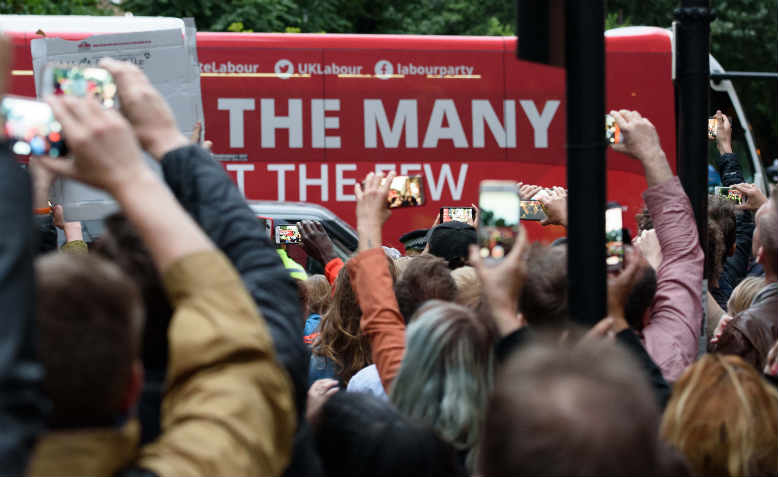 Corbyn rally in Islington, June 2017. Photo: Flickr/Jim Aindow
Corbyn rally in Islington, June 2017. Photo: Flickr/Jim Aindow
The study’s results validate Corbyn’s strategy of holding Labour to principled positions and articulating alternatives to the Tories’ failed economics
The new British Social Attitudes Survey illustrates the fact that Labour leader Jeremy Corbyn’s policies chime with large numbers of people. The recent advances for Labour in the general election can be seen as reflecting the left-leaning tilt of public opinion on key issues. It may also be that having a powerful voice for such ideas in mainstream politics is legitimising views that were long disparaged.
In the major study - carried out by the National Centre on Social Research in 2016 - 48% say they would like higher taxes to pay for more spending on health, education and social benefits. 44% say they want it to stay the same, while only 4% want cuts in taxes.
It is the first time since before the economic crisis of 2008 that the number advocating higher tax rises has outstripped those wanting taxes to remain the same. The relatively high figure of 48% is despite the issue being framed in a conservative way: the left talks about increasing taxes on corporations and wealthy people, not general tax rises.
Roger Harding, head of public attitudes at the National Centre for Social Research, comments: “People’s tolerance for austerity is drying up, even if that means higher taxes”. Support for cuts to public spending is at only 29%. More specifically, 83% think more should be spent on the NHS and 71% want more spending on schools. The era of popular acceptance of austerity is over.
More people agree (42%) than disagree (28%) that government should redistribute wealth from the better off to those who are less well off. While scapegoating of social security claimants remains a potent right-wing weapon, it’s notable that only 21% agree that ‘most social security claimants do not deserve help’. This is the lowest ever figure for this response (the survey began in the 1980s). Only 22% now believe that claimants are “fiddling” the system – a drop from 35% compared to just two years earlier.
It is clear that a shift has taken place in attitudes on major economic issues. Overall the data points towards greater support for increased public spending and investment, with more willingness to back higher taxes to pay for this. A reduction in hostility towards those claiming social security accompanies this. These trends have paved the way for a higher Labour vote on a solidly left-wing platform of ending austerity and scapegoating – and instead investing in jobs and public services.
The survey also indicated a growth in what might be termed socially liberal attitudes. 64% of people now say that same-sex relationships are “not wrong at all”, up from 47% in 2012 (to give the long view, it was 11% in 1987). On abortion rights there has been a general long-term increase in support, but this trend is especially pronounced among Catholics: 61% of Catholics now support a woman’s right to an abortion, compared with 33% in the mid-1980s.
Much of the media coverage has suggested that there’s good news for the Left and also good news for the Right in the survey. The latter part of this claim is based on increased support for a few more or less authoritarian measures connected to alleged terror threats. The survey shows, for example, 53% of respondents backing indefinite detention without trial for terrorism suspects, rather than sticking with the current limit of 14 days.
This interpretation is stretching credibility, as it is on the biggest issues concerning most people that a shift to the left has been seen in recent years. Growing support for detention without trial is scant compensation for the Tories. It does, however, reflect the potency of stoking fears around ‘national security’. This will continue be a prominent line of attack by the Tories and their press.
Overall the results of the survey are hopeful for socialists. They validate Corbyn’s strategy of holding Labour to principled positions and articulating alternatives to the Tories’ failed economics. There is widespread support for higher public spending and wealth distribution.
We knew from the general election results that consistently putting forward left-wing arguments can bend public opinion to the left – rather than resigning ourselves to the fruitless pursuit of a mythical ‘centre ground’. The survey, carried out between June and December 2016, also indicates the changeability of public attitudes. Labour’s recent campaign no doubt strengthened many arguments that already – as shown by the new survey results - commanded high levels of support.
This process is not over. There can be further progress in winning support for the kind of policies and ideas found in Labour’s popular election manifesto ‘For the many, not the few’.
In the context of a pitifully weak government, this growing support can be translated into real victories too. That will require renewing and sustaining the protest movements and trade unions as well as pushing forward Corbyn’s agenda in the sphere of parliamentary politics. The next step in demonstrating popular rejection of austerity – and enthusiasm for an alternative built around investment and greater equality – is Saturday’s national demonstration called by the People’s Assembly.

